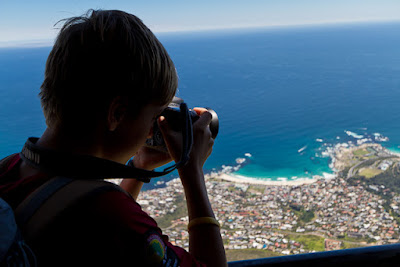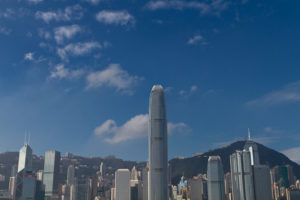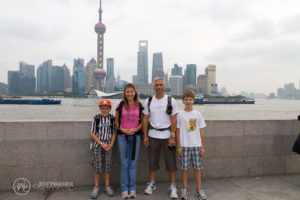After hearing from various people about the top of Table Mountain, we decided to take the Red Line of the city bus tour that stops at the base of the tramway, and loops around Lion’s Head to Camps Bay Beach, our afternoon destination. The bus ticket was good to get on/off at any stop, and included a recorded tour of the history of the city environs. The downtown area is much like many cities, much cleaner than either Casablanca or Accra, and was largely built on an area reclaimed from the sea by the Dutch, given their extensive experience with raising the land, ultimately building on areas formerly below sea level. I’m no linguist, but listening to people speak Afrikaans, it is clearly rooted in Dutch, though other languages have had their effects as well.
 |
| The scar that is District Six. |
We passed by many downtown buildings notable for either cultural or historical reasons, but the area I want to convey details about is District Six. Back in the early 70’s, the government decided that they wanted the land upon which the District Six Township was built upon, and relocated 50,000+ residents from their homes, which were anything from a plywood shack with corrugated metal roof with rocks piled on top to keep it from blowing away in the wind, to stucco or brick/concrete block homes, very small, with bars on windows, perhaps a small fence or wall around the perimeter. The residents were re-located by the apartheid-era government to the Cape Flats, an area where no whites lived, an area of widespread townships and barren land. The area was rife with unemployment, poverty and various health issues, though this was prior to the HIV onslaught that would later ravage the country.

Demonstrations by the displaced residents continued in the leveled District Six area, so long that the government eventually abandoned plans to re-develop the site, leaving the land a bleak scar of nothingness amongst various other townships and buildings. That scar exists to this day, and is now manifested by a strip of grassland, one side of which some government housing is slowly being built, though an alarming few have been finished and occupied. Tens of thousands of people were physically removed from their homes, loaded onto buses and dumped into an area with virtually no resources nor infrastructure capable of supporting them. Positively unthinkable in this day and age (at least in the U.S.), as far worse things are currently happening in other parts of Africa that SAS chooses not to visit for obvious reasons.

Leaving the stark reminder that District Six represents for the rather touristy Table Mountain Cable Car is such an odd thing. Within 10 minutes we were at the base of an incredibly beautiful mountain, a geologic attraction that rapidly rises more than 5,000’ above Cape Town. The relief is very similar to the Owens Valley in the Sierra Nevada range, though it’s even steeper, an impressive sight from any direction. Table Mountain is what sets Cape Town apart from most other areas of Africa, and is truly impressive. The rotating cable car (I’d call it a tram) took about 3 minutes up the 4000’ climb, the top of which is extremely steep, rising at a 45 degree pitch or more. The top was beautiful; you could see trails everywhere down below, with incredible views all around. We had a great African lunch, then headed down to continue on the bus to Camps Bay Beach.
 |
| The top of Table Mountain. |
 |
| The top of the cable car, Lion’s Head down below (you can see the trail we took to the top). |
|
A twenty minute drive downhill found us at Camps Bay Beach, surrounded by locals and tourists alike, enjoying the fine weather. Notoriously windy with typically cold water, the fine white sand beach is beautiful, with the backdrop of the Twelve Apostles of Table Mountain looming above. The boys played in the frigid waters, dug some holes in the sand, typical kid stuff at the beach. We walked the road along the beach, lined by dozens of cafes and sidewalk vendors, then decided to catch the 5:40 bus back toward the waterfront.
 |
| Camps Bay Beach. |














